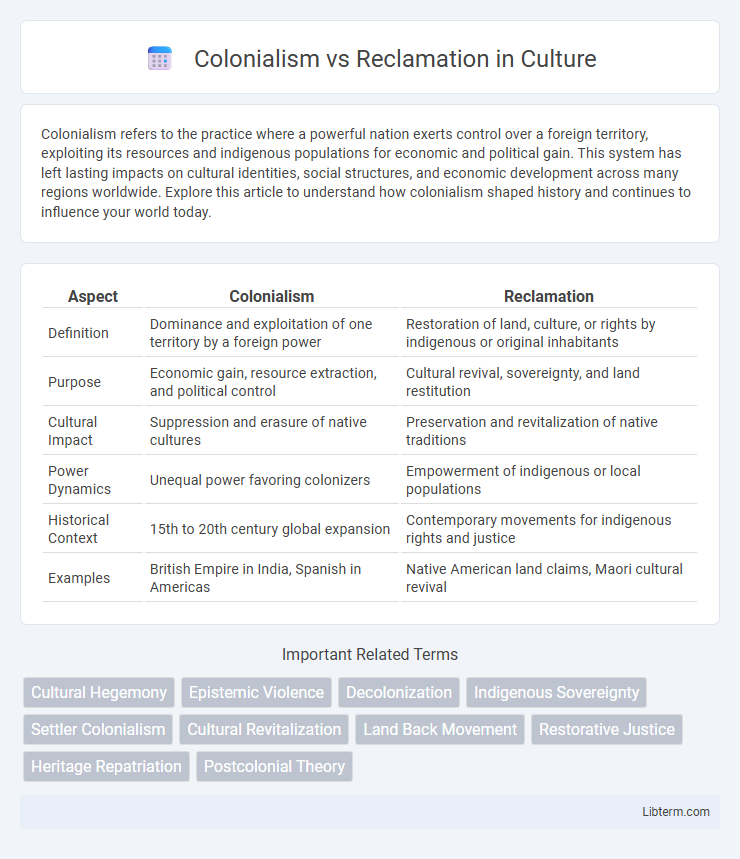Colonialism refers to the practice where a powerful nation exerts control over a foreign territory, exploiting its resources and indigenous populations for economic and political gain. This system has left lasting impacts on cultural identities, social structures, and economic development across many regions worldwide. Explore this article to understand how colonialism shaped history and continues to influence your world today.
Table of Comparison
| Aspect | Colonialism | Reclamation |
|---|---|---|
| Definition | Dominance and exploitation of one territory by a foreign power | Restoration of land, culture, or rights by indigenous or original inhabitants |
| Purpose | Economic gain, resource extraction, and political control | Cultural revival, sovereignty, and land restitution |
| Cultural Impact | Suppression and erasure of native cultures | Preservation and revitalization of native traditions |
| Power Dynamics | Unequal power favoring colonizers | Empowerment of indigenous or local populations |
| Historical Context | 15th to 20th century global expansion | Contemporary movements for indigenous rights and justice |
| Examples | British Empire in India, Spanish in Americas | Native American land claims, Maori cultural revival |
Understanding Colonialism: Historical Context and Impact
Colonialism refers to the historical practice where dominant countries established control over foreign territories, exploiting resources and local populations for economic and political gains. This process resulted in significant cultural disruption, economic dependency, and social inequalities that continue to affect formerly colonized nations today. Understanding colonialism's impact requires analyzing its legacy on global power structures, indigenous rights, and the persistent challenges faced in post-colonial reclamation efforts.
The Mechanisms of Colonial Control
Colonial control relied heavily on mechanisms such as economic exploitation, military dominance, and cultural assimilation to enforce authority over indigenous populations. Administrative systems imposed foreign governance structures that disrupted traditional social orders and resource management. These strategies secured the colonial powers' dominance while undermining the autonomy and identities of colonized societies.
Cultural Erasure and Identity Loss under Colonial Rule
Colonialism imposed foreign rule that systematically erased indigenous languages, customs, and traditions, leading to profound cultural erasure. This suppression disrupted communal identities and replaced native worldviews with the colonizers' narratives, causing pervasive identity loss among colonized populations. Reclamation efforts strive to revive suppressed histories and restore cultural heritage, counteracting the lasting impacts of colonial domination on identity.
Reclamation Defined: Restoring Heritage and Autonomy
Reclamation involves the process of restoring indigenous heritage and reclaiming political, cultural, and social autonomy eroded by colonial rule. It emphasizes revitalizing native languages, traditions, and governance structures to reestablish identity and self-determination. This restoration counters colonial legacies by affirming indigenous rights and fostering resilience through cultural revival and land restitution.
Reclaiming Languages and Indigenous Knowledge
Reclamation of Indigenous languages and knowledge combats the erasure caused by colonialism, fostering cultural resilience and identity restoration. Efforts include revitalizing endangered languages through community-led education programs and preserving ancestral ecological wisdom to support sustainable land management. Empowering Indigenous voices in cultural and linguistic preservation promotes healing from historical oppression and strengthens intergenerational continuity.
Land Back Movements: Restoring Ancestral Territories
Land Back movements advocate for the restoration of ancestral territories to Indigenous peoples, challenging the historical impacts of colonialism that dispossessed them of their lands. These movements emphasize reestablishing Indigenous sovereignty, cultural practices, and environmental stewardship over traditional lands. Successful reclamation efforts often involve legal battles, policy reforms, and grassroots activism aimed at reversing centuries of colonial land seizures.
Economic Reclamation: From Exploitation to Empowerment
Economic reclamation transforms colonial-era exploitation by fostering sustainable development and local ownership of resources. This shift prioritizes equitable wealth distribution, enhancing community resilience and reducing dependency on foreign powers. Empowering indigenous economies revives cultural identity while promoting long-term prosperity and social justice.
Art, Literature, and the Rewriting of Narratives
Colonialism shaped art and literature by imposing dominant narratives that marginalized indigenous voices and histories, often commodifying cultural symbols for imperial agendas. Reclamation efforts emphasize decolonizing these creative expressions, rewriting narratives to center indigenous perspectives, identities, and lived experiences. Contemporary works challenge colonial legacies by restoring historical accuracy, celebrating cultural resilience, and fostering a more inclusive understanding of history and heritage.
Legal Battles: Justice and Reparations for Colonized Peoples
Legal battles over colonialism and reclamation focus on justice and reparations for colonized peoples through landmark cases such as the International Court of Justice's advisory opinions and regional human rights tribunals. These disputes address land rights, forced labor, and cultural heritage, with indigenous groups seeking recognition, restitution, and compensation for historical injustices. Efforts in international law include treaties, reparations commissions, and restitution programs aimed at legally acknowledging and remedying colonial-era exploitation and dispossession.
The Ongoing Journey: Future Prospects for Reclamation
Reclamation efforts emphasize restoring indigenous land rights and cultural heritage by undoing colonial impacts on environment and society. Future prospects include leveraging sustainable land management practices and advancing legal frameworks to support indigenous sovereignty and environmental justice. Technological innovation and international cooperation play critical roles in empowering communities to reclaim territories and promote ecological resilience.
Colonialism Infographic

 libterm.com
libterm.com